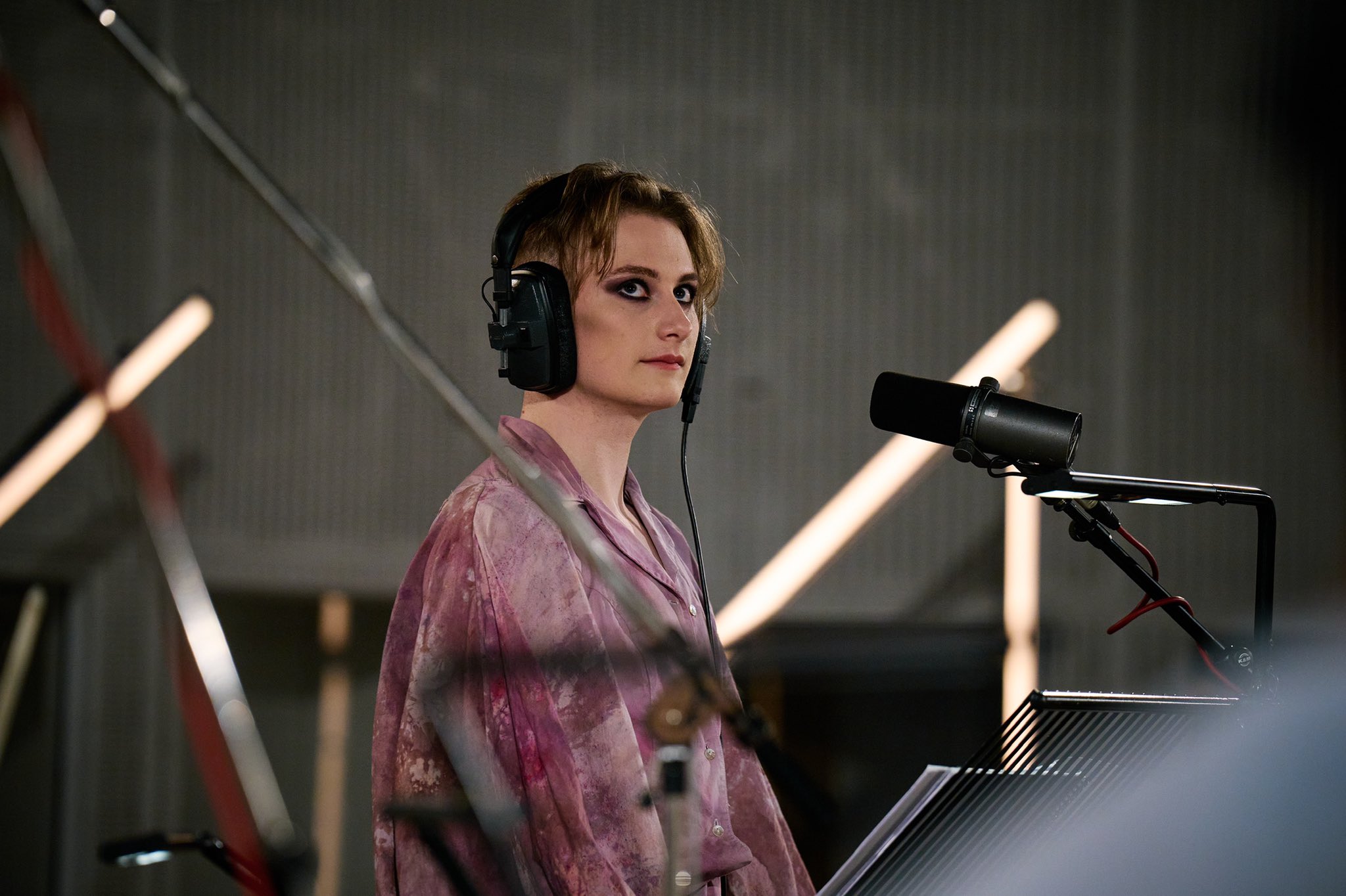As we approach the halfway point in the second year of Paraorchestra’s Musicians in Residence programme funded by a bursary from Sky Arts, we’re checking in with our two 2022/3 residents, Rylan Gleave and Hattie McCall Davies – two unique artists making fascinating and adventurous music that is completely their own.
First up is composer and vocal performer Rylan Gleave.
Rylan’s working relationship with the Paraorchestra is barely a year old – Rylan first joined us for a spellbinding reimagining of Scott Walker’s iconic record The Drift in Reinventing the Orchestra with Charles Hazlewood for Sky Arts – but already he’s made a huge impact.
A prolific collaborator, his vast artistic output ranges from contemporary classical to ferocious avant-garde metal.
Read on for a short-ish interview on his experience of the residency and ambitious next steps.
You’re a relatively new member of Paraorchestra – could you tell us a bit about your journey? How you first joined Paraorchestra and what compelled you to apply for the MiR programme?
It was lockdown when I saw the callout for new musicians to join Paraorchestra. I was thrilled that composers were included this time round, and wrote in as a composer/performer, half-expecting to be asked to take the vocalist hat off; my voice was (and is) still settling into its new range due to Testosterone, as part of transition. The interview with Charles and Lloyd was like a chat with old friends; they listened to my rambling explanations about my musical journey with interest, and that feeling of being understood meant that I was relaxed enough to actually sing decently!
I applied for the MiR programme on the back of The Drift project, Oliver Vibrans’ spectacular re-imagination of Scott Walker’s songs that were recorded at Abbey Road Studios for Reinventing the Orchestra, with Paraorchestra and Pulled By Magnets.
It was my first project performing with Paraorchestra, and I’d never been in an environment like that. It’s hard to explain without being in it, but the anxiety surrounding being a musician — the self-doubt, the panic about navigating professional relationships, the gaps in my training — dissolved in the first rehearsal. The MiR programme promised more of that rare (and addictive!) feeling, and the opportunity to work on exactly what I wanted to do.
all musical adventures I undertake feed my intuition”
What are the main areas of focus for your residency?
I’ve been working on a Requiem-inspired piece under my moniker, All Men Unto Me, and using that as a framework to develop a variety of skills that I need within it. I’ve been writing text, experimenting with movement choreography, brushing up on my piano playing, scheduling 1:1s with the performers, chatting to labels and directors, having singing lessons, and workshopping material at Neon Fable studios with my collaborators. It’s been great getting to learn about writing for new instruments idiomatically — I’ve not written for a bunch of these before! — and I feel very blessed that I can focus on this work with a fantastic group of people.
It makes a world of difference working with some other trans/neurodivergent artists too, especially taking into account the themes of patriarchy/social hierarchy that I’m working with. I’ve been developing my solo sets for live performances, and had a great session on live looping with Amaya López-Carromero (Maud the Moth) a few months ago. I’ve also used some of the time to focus on inhabiting the space of Ashenspire, the band I sing live with, more fully. It’s exciting to have the space to try so many things I haven’t been trained in, and to have the full support of Paraorchestra for any idea I bring them.
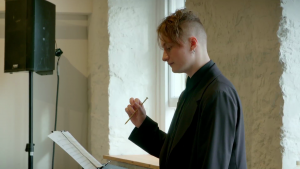
Rylan practising for The Drift, image courtesy of Sky Arts
You work in many different artistic guises – frontman, composer, singer – could you talk a bit more about the interplay between each of these practices, and how you hope to develop them throughout the programme?
I think what’s become apparent over the residency so far is that all musical adventures I undertake feed my intuition. There’s been a fair amount of unlearning shame and guilt from previous collaborations, in which I was made to feel as though my intuition was ‘wrong’, or I was a ‘worse’ musician for having interests outside of a particular genre. I think that’s rubbish. Every project I engage with or skill I brush up on means I learn something else, and my ears attune to something new.
When I’m performing music that I’ve written for myself and others, I listen to it in a different way, from inside the sound. This is turning out to be a far more intuitive way of working, getting together with artists that I am building connections with and seeing where ideas go collaboratively, rather that writing highly specific material that may or may not be idiomatic to an instrumentalist.
Could you tell us a little more about any collaborators you are working with throughout the year?
For the Requiem project, I’m working with Scott McLean (guitarist, producer, recording and mixing engineer), Simone Seales (cellist), Jeremiah Stephenson (organist), Alasdair Dunn (drums and percussion), Ben Brown (bass guitar), and eventually Alex Wharton (mastering engineer who I met at Abbey Road after The Drift). There’s a mix of classically trained folk, self-taught, and DIY musicians from a variety of backgrounds, which has been beneficial in helping me try to find the space in which this music exists.
It’s been an incredibly healing and affirming time, in a lot of ways.”
What have been the key benefits of the residency so far?
I feel like I’ve learned so much about myself as both an artist and a person over the course of the residency, which is crucial at this early stage of my career. That knowledge pertaining to how I work, the things that have inhibited me in previous collaborations, and the surroundings I need to create to contribute properly will carry me through this residency and into future projects. It’s been an incredibly healing and affirming time, in a lot of ways.
Disabled and neurodivergent folk aren’t often given the same access to arts opportunities as non-disabled folk, for a variety of reasons. Access can be difficult to explain to organisations, and sometimes you don’t know what you need until you’re in a situation where you’re floundering. With Paraorchestra, the space is held to say at any point ‘sorry, this isn’t working for me’ or ‘I hadn’t anticipated this challenge, can we have a chat about ways around it?’
One thing I’ve found really beautiful is the support for all manner of concepts and ideas that I’ve brought to the team, regardless of what they are or where they originate from. I work with sensitive material a lot of the time, including trauma, which can be difficult to talk about. I’ve never felt discouraged from working in these fields, rather, the opposite, and I’ve never been made to feel like what I have to say isn’t important.
Can you tell us more about how the MiR programme compares to other programmes of development or study you’ve undertaken before?
In all honesty, the funding allows for me to actually dedicate significant time to the work that I want to do on the programme. I’ve been really fortunate with composer development opportunities, but a lot of these have been part-time or of shorter duration, and nowhere in the realm of ‘I can pay multiple months of rent on this alone’. Having the chance to be more selective with the work I want to do outside this residency means that I’m not scrabbling for lots of small projects to support the work I’m passionate about. The support from the Paraorchestra team also has made a world of difference; the regularity of the check-ins, their genuine interest in what I’ve been doing, and the connections that the team have for relevant folk is revolutionary in how I structure my time, set milestones, and reach people.
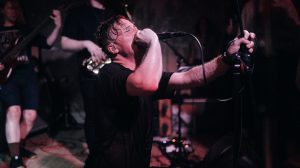
Rylan performing with Ashenspire, image courtesy of Calum McMillan
What do you hope to get out of your year in the MiR programme?
I feel like I’ve got so much already! I absolutely want to finish the Requiem project; I’ve had support from Sound and Music, the Make It Happen Fund, Shaper/Caper, and create:inclusion too, and I’d love to have the album ready to go as soon as possible for wide dissemination of what I believe will be a really significant work. This is accompanied by all of the skills that I’ve been learning and polishing along the way; they’re not measurable outcomes in the same way, but they’re vital to my development as a young artist. I’m fortunate also now that I’ve joined the Paraorchestra as a Trustee, and hope to be more involved in the dizzying period of growth that Paraorchestra is occupying.
Follow Rylan @RylanGleave
**
The Paraorchestra Musicians in Residency programme was created in recognition of a lack of professional support and development opportunities for musicians identifying as D/deaf, disabled, or neurodiverse.
The bursary from Sky Arts, which formed part of Charles Hazlewood’s appointment as their Ambassador for Music, currently supports two Musicians in Residence. It is our hope that we may continue to support and develop a regular residency programme after 2023 as part of a wider scheme of professional artist development.

